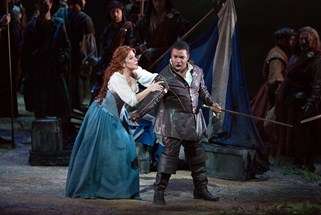|
Back
Another Plunge for the Lady in the Lake New York
Metropolitan Opera
12/11/2015 - & December 15, 19, 22, 26, 2015
Gioachino Rossini: La donna del lago
Joyce DiDonato (Elena), Lawrence Brownlee (Uberto/Giacomo), Daniela Barcellona (Malcolm), Eduardo Valdes (Serano), Oren Gradus (Duglas d’Angus), John Osborn (Rodrigo di Dhu), Olga Makarina (Albina), Gregory Schmidt (Bertram)
The Metropolitan Opera Orchestra and Chorus, Michele Mariotti (conductor)
Paul Curran (director), Kevin Knight (set and costume designer), Duane Schuler (lighting designer)

J. DiDonato, L. Brownlee (© Marty Sohl)
Rossini’s rarely performed La donna del lago has returned to the Met stage. Paul Curran’s spare traditional approach, which originated in Santa Fe in 2013, entered the house’s repertoire last season and will enjoy a modest new outing of five performances. The entire production, as well as the revival, serves more or less completely as a vehicle for the rising (risen?) star Joyce DiDonato, who has turned to this opera’s heroine Elena and similar roles after an accomplished career in Rossini’s famed mezzo parts – Rosina in The Barber of Seville and the title character in La Cenerentola. DiDonato’s technique and clarity of tone are not in doubt. But here in the cavernous Met, the voice sounded small at times, clearly capable of rising over the orchestra but not filling the house with the true effulgence she displayed in Santa Fe. Not even the prized finale “Tanti affetti” captured the voice’s true glory.
Rossini’s opera features a tiresome plot. Elena faces three suitors: her true love Malcolm, her obnoxious fiancé Rodrigo, and finally King James V (Giacomo) of Scotland, Rodrigo’s enemy whom she – just to make things more confusing – happens to meet as a hunter disguised under the name Uberto. At the same time she must contend with her father, Douglas (Duglas), who tries to run her life as though she were some sort of medieval millennial. After three hours of wrestling with the complicated dilemma through so many cadenzas to express how difficult the resolution can only be, Rodrigo conveniently dies in battle. The King ends the opera by revealing his identity and uniting Malcolm with Elena to live happily ever after.
The rest of the cast acquitted itself very well but most suffered DiDonato’s disadvantage versus the sheer size of the house. The major exception was the capable Lawrence Brownlee, whose disciplined approach rendered his portrayal of Uberto/Giacomo more credible than before and dispelled the unfortunate notion that he is the leggero tenor opera companies hire when they cannot book Juan Diego Flórez (who has sung Uberto/Giacomo and other roles of the same Fach around the world). Daniela Barcellona had a fine night as Malcolm, though her costuming in baggy male clothes made for some awkward love scenes. Oren Gradus sang an admirably noble Douglas. John Osborn’s Rodrigo did rather less well in his rebellious role as chief of the Highlanders. Michele Mariotti gave a straightforward rendering of the score.
Curran’s production does not figure among the Met’s most exciting. A patch of Highland earth dominates Kevin Knight’s set design and separates when necessary to allow for other representational sets to emerge. His bright and colorful costumes (with the exception of Malcolm’s) suited the work better, however.
Paul du Quenoy
|